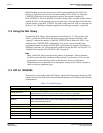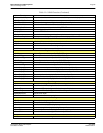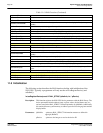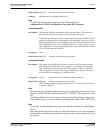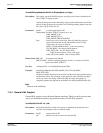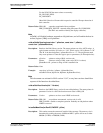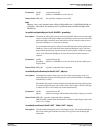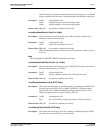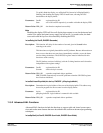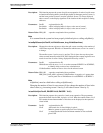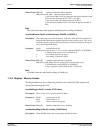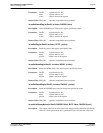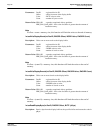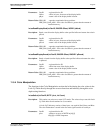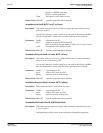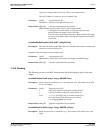
Page 62
Epson Research and Development
Vancouver Design Center
S1D13505 Programming Notes and Examples
X23A-G-003-07 Issue Date: 01/02/05
To quickly blank the display, use seDisplayFifo() instead of seDisplayEnable().
Enabling and disabling the display FIFO is much faster, allowing full CPU
bandwidth to the display buffer.
Parameters: DevID - registered device ID
State - set to ON or OFF respectively to enable or disable the display FIFO
Return Value: ERR_OK - the function completed successfully
Note
Disabling the display FIFO will force all display data outputs to zero but horizontal and
vertical sync pulses and panel power supply are still active. As stated earlier, the hard-
ware cursor and ink layer are not affected by disabling the FIFO.
int seDelay(int DevID, DWORD Seconds)
Description: This function will delay for the number of seconds given in Seconds before
returning to the caller.
This function was originally intended for non-PC platforms. Because information on
how to access the timers was not always immediately available, we use the frame
rate for timing calculations. The S1D13505 registers must be initialized for this
function to work correctly.
The PC platform version of seDelay() calls the C timing functions and is therefore
independent of the register settings.
Parameters: DevID - registered device ID
Seconds - time to delay in seconds
Return Value: ERR_OK - operation completed with no problems
ERR_FAILED- returned only on non-PC platforms when the S1D13505 registers
have not been initialized.
int seGetLinearDispAddr(int device, DWORD * pDispLogicalAddr)
Description: Determines the logical address of the start of the display buffer. This address may
be used in programs for direct control over the display buffer.
Parameter: device - registered device ID
pDispLogicalAddr - logical address is returned in this variable.
Return Value: ERR_OK - operation completed with no problems.
11.5.2 Advanced HAL Functions
Advanced HAL functions include the functions to support split and virtual screen opera-
tions and are the same features that were described in the section on advanced programming
techniques.
int seSplitInit(int DevID, DWORD Scrn1Addr, DWORD Scrn2Addr)



